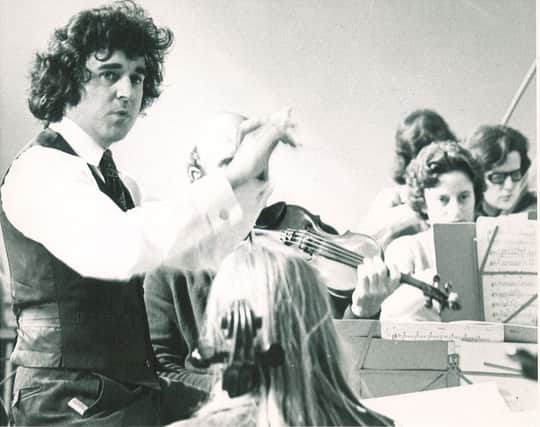Will SCO’s 40th birthday party include new Edinburgh venue?


I’m just old enough to recall its origins as the flexible freelance band assembled in the early 1970s, under the umbrella management of the Scottish Philharmonic Society, to undertake pit duty for Scottish Opera productions when the SNO (now RSNO) or BBC SSO were unavailable. By 1974, however, motivated by a wish to “go solo” and make its own mark, the SCO was born.
From the start, this compact, chamber-sized alternative to the big orchestras filled a gap in the market that hadn’t been fully exploited by Leonard Friedman’s Scottish Baroque Ensemble (now the Scottish Ensemble) or the late Adrian Sheppard’s Cantilena, both of which explored their own niche repertoire and eclectic delivery style.
Advertisement
Hide AdWhat the SCO brought to the table was a high-calibre chamber orchestra, containing some of the finest young players around (Janet Hilton was the first principal clarinet before she found fame as a soloist) and driven by a commitment to present the full gamut of chamber repertoire in the best possible light. Hilton, now in her late 60s and teaching in London at the Royal College of Music, remembers the “high expectations” demanded by the conductors who shaped the initial years.
“It was a terrific orchestra from the word go,” she says. Indeed, those first few seasons with the late Roderick Brydon as the first principal conductor, and the onset of an even longer relationship with Sir Charles Mackerras as principal guest, saw the SCO emerge as a world-ranking ensemble with a sound that was stylish, precise and electrifying.
When Hilton moved to America in 1980 to join the illustrious St Paul Chamber Orchestra, she quickly realised what she was missing. “The SCO were such an individual and spontaneous bunch who talked easily with conductors. That didn’t happen with the St Paul’s players. It was boring by comparison.”
Double bassist Adrian Bornet was immediately hit by the same sense of something special happening. “We were trying to find a voice, and in doing so, setting the bar particularly high,” he recalls. “Once it was set, we just kept pushing it up.”
The SCO’s first managing director, Michael Storrs, brought with him a wealth of artists agency experience, so the initial decade, with violinist John Tunnell as an inspirational leader, was already awash with regular top soloists and conductors – violinist Oscar Shumsky, conductor James Conlon, Mitsuko Uchida’s complete Mozart piano concerto series and, of course, Mackerras’s initial appearances.
When Ian Ritchie took over as manager in the mid 1980s, he added a new dimension to the SCO’s activity, not least the creative relationship initiated with composer Peter Maxwell Davies, whose ten Strathclyde Concertos, commissioned by the then Strathclyde Regional Council for the SCO players, gave rise to educational programmes that were to involve and help establish such upcoming composers as James MacMillan, Gordon McPherson and Alasdair Nicolson.
Advertisement
Hide AdFor Steve King, who joined as a violist in 1983, and whose involvement in the educational programmes led to him combining his SCO playing with the position as director of music at Heriot-Watt University, these were “golden years”. “Max was younger then, so it was exciting to be involved so directly with his music,” he says.
Over the past decade, current manager Roy McEwan has championed music not instantly thought of as chamber orchestra repertoire: Beethoven, Schumann and Brahms under Joseph Swensen; Berlioz under the latest principal conductor Robin Ticciati. And composer associations continue, the most recent being Martin Suckling’s appointment as associate artist, whose latest commission, Six Speechless Songs, forms part of this week’s anniversary programme.
Advertisement
Hide AdIf there’s one birthday present McEwan would love to give his orchestra, it is a decent home venue in Edinburgh. “We need a high quality base in Edinburgh,” McEwan says. “We’re not far from being able to say something. There are a couple of venues that are high up the list, which imply working with certain artistic partners. These venues are pretty central. We won’t be building at the waterfront.”
Could it actually happen this time? Hopefully we’ll know before the SCO turns 41.
Robin Ticciati conducts the SCO’s 40th Birthday concerts, with soloist Maria Joao Pires, at the Usher Hall, Edinburgh, on 6 February and the City Halls, Glasgow, on 7 February, www.sco.org.uk